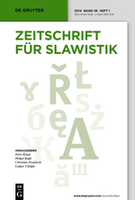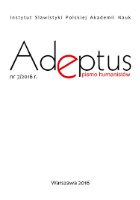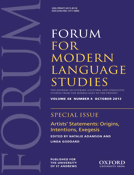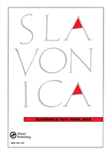
ZEITSCHRIFT FUR SLAWISTIK
Scope & Guideline
Bridging Disciplines in the Study of Slavic Heritage
Introduction
Aims and Scopes
- Slavic Linguistics:
The journal publishes research on various aspects of Slavic languages, including syntax, morphology, phonetics, and sociolinguistics, providing insights into the structural and functional characteristics of these languages. - Cultural Studies and Literature:
It features analyses of Slavic literature and cultural phenomena, exploring historical contexts, literary movements, and contemporary issues impacting Slavic societies. - Language Policy and Identity:
Research on language attitudes, language policy, and the interplay between language and national identity is a consistent focus, particularly in the context of socio-political changes in the region. - Interdisciplinary Approaches:
The journal encourages interdisciplinary studies that connect linguistics, literature, history, and cultural studies, facilitating a comprehensive understanding of Slavic contexts. - Contemporary Issues:
Recent publications reflect on contemporary themes such as multilingualism, migration, and the impact of conflict on language and society, showcasing the journal's responsiveness to current events.
Trending and Emerging
- Impact of War on Language and Identity:
Recent articles focus on how conflicts, particularly the Russo-Ukrainian war, influence language use, identity formation, and cultural expressions, making this a pivotal area of research. - Multilingualism and Language Contact:
There is a growing emphasis on multilingualism and its implications in Slavic societies, particularly in border regions, showcasing the complexity of language dynamics in a globalized world. - Cultural Memory and Trauma:
The exploration of cultural memory, trauma, and their manifestations in literature and society has emerged as a significant theme, reflecting the ongoing processing of historical events in contemporary narratives. - Digital Humanities and Slavic Studies:
The integration of digital tools and methodologies in Slavic studies is gaining traction, with researchers employing technology to analyze texts and linguistic data, enhancing accessibility and engagement. - Contemporary Slavic Literature:
A noticeable increase in studies focusing on contemporary Slavic authors and literary movements indicates a shift towards examining current cultural productions and their societal implications.
Declining or Waning
- Historical Linguistics:
Although historical linguistics has been a long-standing area of interest, recent publications suggest a decline in focus on diachronic studies, with fewer papers exploring the evolution of Slavic languages over time. - Traditional Literary Criticism:
There appears to be a waning interest in traditional literary criticism methods that do not incorporate contemporary theoretical frameworks, as more articles adopt interdisciplinary and modern analytical approaches. - Regional Studies of Lesser-Known Slavic Languages:
Papers focusing on less widely studied Slavic languages and dialects have become less frequent, indicating a possible shift towards more dominant languages and their cultures. - Formal Syntax and Grammar:
The exploration of formal syntactic theories, while still present, seems to be receiving less attention compared to more applied and sociocultural linguistic studies. - Classic Slavic Literature:
There is a noticeable reduction in the publication of studies centered on classic Slavic literary works, possibly overshadowed by contemporary literature and current sociopolitical themes.
Similar Journals

Studia Litterarum
Advancing Scholarly Dialogue in Literature and CultureStudia Litterarum, published by the esteemed Russian Academy of Sciences at the A.M. Gorky Institute of World Literature, serves as a vital platform for the exploration and analysis of literature and cultural studies. With an ISSN of 2500-4247 and an E-ISSN of 2541-8564, this open access journal has been disseminating valuable research since 2016, reaching a global audience keen on advancing the understanding of literary theory and cultural narratives. Based in Moscow, Russia, the journal has achieved remarkable academic recognition, holding a Q2 classification in Cultural Studies and a prestigious Q1 tier in Literature and Literary Theory, as of 2023. Its Scopus rankings underscore its relevance, with a notable placement in the 51st percentile for literature and literary theory and 27th percentile for cultural studies. Studia Litterarum not only opens doors to scholarly dialogue but also enhances the visibility of contemporary literary scholarship, making it an essential read for researchers, professionals, and students alike seeking to deepen their understanding of the intricate dynamics within literature and cultural studies.

Jordan Journal of Modern Languages & Literature
Cultivating Knowledge in Linguistics and LiteratureJordan Journal of Modern Languages & Literature is a prestigious academic journal published by Yarmouk University, Deanship of Research & Graduate Studies. This journal serves as a vital platform for scholars and researchers in the fields of linguistics and literature, offering a well-rounded examination of modern languages and literary theory. With an impressive Q2 ranking in Linguistics and Language and a Q1 distinction in Literature and Literary Theory as of 2023, it consistently features high-quality research that contributes to the advancement of knowledge in these domains. The Scopus rankings further reflect its academic rigor, placing it in the 79th percentile for Literature and Literary Theory and maintaining significant influence in related fields, making it an essential resource for researchers, professionals, and students alike. Although it does not operate under an open-access model, the journal's commitment to publishing groundbreaking studies can significantly aid in the understanding and progression of modern linguistic and literary practices. The Jordan Journal of Modern Languages & Literature continues to be an influential voice in fostering scholarly dialogue and advancing research in the humanities.

Adeptus
Fostering Innovative Scholarship in Slavic StudiesAdeptus is a pioneering open-access journal published by the Polish Academy of Sciences, Institute of Slavic Studies, specializing in Slavic studies and cultural research. Since its inception in 2014, the journal has aimed to foster scholarly dialogue and advance knowledge across various disciplines related to Slavic languages, literature, history, and sociology. With an ISSN of 2300-0783, Adeptus has positioned itself as a vital resource for researchers, professionals, and students engaged in Slavic studies, offering a platform for high-quality, peer-reviewed articles that explore diverse topics within the field. The journal's open-access model promotes accessibility and dissemination of knowledge, making it a significant contributor to the academic landscape. Located in Warsaw, Poland, Adeptus continues to thrive as a key outlet for innovative research, inviting submissions that embody rigorous scholarship and insightful perspectives.

Acta Baltico-Slavica
Engaging with Cutting-Edge Research in Slavic StudiesActa Baltico-Slavica, an esteemed academic journal published by the Polish Academy of Sciences, Institute of Slavic Studies, serves as a vital platform for the exploration of Slavic cultures, languages, and historical narratives. Since its transition to Open Access in 2014, the journal has fostered inclusivity and accessibility, allowing researchers, professionals, and students to engage with cutting-edge scholarship in the fields of History, Linguistics and Language, and Literature and Literary Theory. With a commendable impact as indicated by its category quartile rankings (Q2 in History and Literature, Q3 in Linguistics), and Scopus rankings reflecting its significance within the academic community, Acta Baltico-Slavica not only contributes to the rich tapestry of scholarship surrounding the Baltic and Slavic regions but also encourages interdisciplinary dialogue. The journal’s commitment to advancing knowledge across its fields of study makes it a prominent destination for scholarly discourse and research inquiry.

Philologica Canariensia
Elevating scholarly communication in the humanities.Philologica Canariensia is a distinguished academic journal published by the University of Las Palmas de Gran Canaria, focusing on the vibrant fields of Literature and Literary Theory as well as Linguistics and Language. With an impact factor that positions it in the Q1 and Q2 quartiles in its respective categories as of 2023, the journal has established itself as an important platform for scholarly communication and research. Since transitioning to Open Access in 2014, it has broadened its reach, allowing researchers, professionals, and students from around the globe to access high-quality publications without barriers. With a commendable presence in Scopus rankings, including a rank of #309 out of 1106 in Literature and Literary Theory, Philologica Canariensia aims to foster an interdisciplinary dialogue and advance knowledge in the humanities. The journal's commitment to publishing innovative research makes it an essential resource for anyone engaged in exploring linguistic and literary phenomena.

FORUM FOR MODERN LANGUAGE STUDIES
Exploring the Depths of Modern Linguistic ThoughtFORUM FOR MODERN LANGUAGE STUDIES is a prestigious academic journal published by Oxford University Press that has been serving the fields of literature and linguistics since its inception in 1965. This journal, with an ISSN of 0015-8518 and an E-ISSN of 1471-6860, plays a crucial role in advancing scholarly discourse on modern language studies, including literature and literary theory. With an impactful presence in both the linguistic and literary domains, it has been recognized in 2023 with a category ranking of Q2 in Literature and Literary Theory and Q3 in Linguistics and Language. It stands out in the competitive landscape, holding a notable position within Scopus rankings, including a 70th percentile ranking in Literature & Literary Theory. While the journal currently does not offer open access options, it remains a vital resource for researchers, educators, and students passionate about the transformative power of language and literature. Its commitment to quality research and robust academic discussion underscores its importance, making it a key platform for those aiming to contribute to modern language scholarship.

SLAVONICA
A Critical Platform for Slavic Studies ScholarshipSLAVONICA is a distinguished academic journal dedicated to the exploration and analysis of Slavic studies, incorporating a wide array of cultural, historical, and linguistic perspectives. Published by Routledge Journals, Taylor & Francis Ltd, this journal serves as a critical platform for interdisciplinary scholarship, emphasizing the dynamic nature of Slavic cultures and languages. Though it currently does not offer Open Access, SLAVONICA is an important resource for researchers, professionals, and students seeking to engage with the latest academic discourse in the fields of Cultural Studies, History, Literature, and Linguistics, achieving a recognized place in the Q4 quartile across several categories as of 2023. With coverage spanning from 1994 to 2024, and its commitment to fostering academic inquiry, SLAVONICA plays a vital role in elevating the understanding of Slavic heritage and contemporary issues, making it essential reading for anyone interested in the complexities of this region.

Zbornik Matice Srpske za Slavistiku-Matica Srpska Journal of Slavic Studies
Cultivating Knowledge in Slavic Linguistics and CultureZbornik Matice Srpske za Slavistiku - Matica Srpska Journal of Slavic Studies, published by Matica Srpska in Serbia, is a prominent academic journal focusing on the diverse and rich field of Slavic studies. With an ISSN of 0352-5007 and a commitment to advancing knowledge in linguistics, literature, and cultural contexts, this journal serves as a vital resource for researchers, professionals, and students alike. Although designated as an open access journal, its significance is highlighted by its ranking in the lower quartiles of 2023 across various categories, including Q4 in Linguistics and Language and Q3 in Literature and Literary Theory. The journal's Scopus rankings further reflect its position, with a percentile of just 8th for Language and Linguistics. These factors underscore the journal's ongoing contribution to Slavic scholarship from 2019 to 2024, fostering dialogue and exploration in a field that remains crucial for understanding Eastern European cultures and languages.

Studi Slavistici
Fostering Innovative Perspectives in Cultural StudiesStudi Slavistici is an esteemed academic journal published by FIRENZE UNIV PRESS, focusing on the rich and diverse fields of Cultural Studies, Linguistics and Language, and Literature and Literary Theory. Since its initiation in 2004, it operates under an Open Access model, providing unrestricted access to its contents and fostering a wider dissemination of research. Based in Italy, this journal serves as a vital platform for scholars and researchers engaged in Slavic studies and beyond, encouraging interdisciplinary dialogue and innovative approaches. With its current Quartile rankings in the Q4 category across various domains, it plays a significant role in shaping dialogues within the academic community while offering insights into contemporary and historical perspectives. By maintaining an inclusive vision and engaging with critical issues, Studi Slavistici remains dedicated to advancing knowledge and scholarship in these intricate fields.

Lingua Montenegrina
Exploring the Depths of Montenegrin Language and LiteratureLingua Montenegrina is a distinguished academic journal dedicated to exploring and advancing the fields of Montenegrin language and literature. Published by the Institute of Montenegrin Language and Literature, this journal serves as a vital platform for researchers, educators, and students interested in the nuances and development of Montenegrin linguistics, literature, and cultural studies. With an ISSN of 1800-7007, it contributes significantly to the scholarly discourse in the region and beyond. While the journal operates under a traditional subscription model, it ensures that its readership has access to high-quality research that is pivotal for understanding Montenegrin identity and cultural expressions. The commitment of Lingua Montenegrina to rigorous academic standards and its focus on regional studies positions it as an essential resource for those looking to deepen their understanding of the Montenegrin language and its literary heritage.